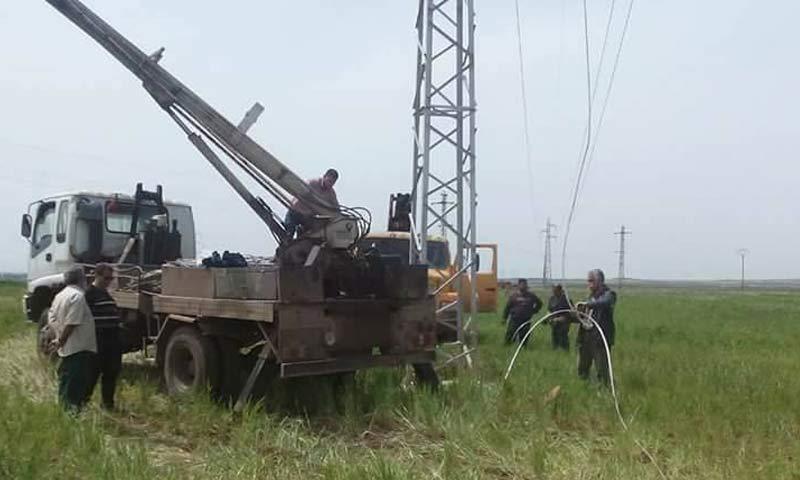Enab Baladi – Daraa
The electricity and water companies in Syria have become notorious for extorting the locals in Daraa with exorbitant sums. These bills that have accumulated after years of conflict are used to burden the population with heavy economic and security obligations. Paying the bills has become the sole guarantee to enjoy government services.
Paying the bills allows the state treasury to recover deficits out of accumulated bills, which have been piled and waiting to be paid by citizens during the past eight years when the Syrian opposition controlled the area, and the state institutions stopped providing services to the population, although electricity and water networks are functioning at irregular intervals in some areas of Daraa.
These institutions have been replaced by local councils formed by the Syrian Interim Government and local and international development organizations.
More than a year after the Syrian regime took control of the area, security and military checkpoints are still forcing the residents of Daraa to submit their latest electricity bill, forcing them to pay old water and electricity bills.
The regime, with Russian support, took control of Daraa in July 2018, in a settlement agreement which stipulated ending security harassment and improving the services and economic situation in the southern region.
State departments and regime’s checkpoints collect payments for electricity bills
Syrian citizens in Daraa need to reach out to the state departments and institutions in order benefit from legal and civil services, especially those services which have been suspended when the state institutions were shut down in the area. However, the locals find accumulated electricity and water bills waiting for them once they head to any government department, which contributes to hindering the completion of their transactions.
Abdulaziz al-Hussein, a government employee from the western region of Daraa, was asked to pay his bills, including the water and electricity ones, in order to get his legal transaction completed.
Indeed, al-Hussein, 40, told Enab Baladi that he had to pay the bills accumulated over the past eight years at an estimated cost according to the last paid cycle before he stopped paying, although he did not benefit from water and electricity services during that period.
Al-Hussein, who was fired from his job after failing to show up at the company he worked for following the opposition’s seizure of the area and the blockage of roads, stated: “When the settlement agreement was signed, the regime and its Russian ally tempted the employees by promising them to get them back to their jobs. Although we paid our debt to the government, our legal status remained unsettled and we are still jobless.”
Abu Alaa, a transportation truck driver between Damascus and Daraa, claimed that the security checkpoints request recent electricity bills payment receipts from drivers and passengers of public or private buses, in order to force citizens to pay their accumulated government dept.
Abu Alaa, 43, explained to Enab Baladi, that he went to the electricity company in Daraa, and paid the accumulated bills for the past years so that he can keep his job and be able to travel to and from Damascus.
Threatening to cut off the electricity
Daraa General Electricity Company demanded residents of the downtown district to pay the accumulated electricity bills, threatening to cut off the electricity in the neighborhood if the bills were not paid. This decision was considered by the locals as an act of provocation put forward by the regime apparatus in order to exert more pressures on them.
Faisal Abazeed, a member of the Central Committee in Daraa, which is in charge of implementing the settlement agreement with the Syrian regime, posted on his Facebook account that the governor of Daraa, Mohammed Khalid al-Hanous, and his “bandits” are trying to take revenge on the residents of the city by forcing them to pay the bills. He added: “We will not pay. You are free to deduce whatever meaning you wish out of our stance. However, we hope that you do not push us to take the situation to a grave turn.”
The former leader of the opposition factions, Adham al-Karad, who is still living in Daraa after the settlement, also wrote a post on Facebook, addressing the governor of Daraa: “What al-Hanous could not take by force, will not be able to take by extortion in exchange for government services. Those corrupt government departments and bureaucratic institutions are not compatible with the next phase.”
Al-Karad considered that extorting the population of Daraa in exchange for government services is an oppressive method dictated by security officials, and this practice of threatening is a “war crime against a society.”
Mounir al-Qasim, director of network monitoring at Daraa General Electricity Company, indicated that, since the beginning of this year until August 18, the company had recorded 221 illegal acquisitions of electricity services, as reported by the state-run Tishreen newspaper on August 24.
The estimated amount of illegally exploited electricity reached 2.8 million kWh, worth 76.5 million Syrian pounds.
While the Syrian regime controlled Daraa, with Russian support and patronage, the area recorded a minimum return of services, especially electricity and water. However, economic and security pressures strained the population, in contrast to government promises.
The electricity service in Daraa is currently following the rationing program, by cutting off the electricity for hours and supplying the region again during specific hours of the day. The electricity transmission rate has risen during the past two months, reaching an average of four hours of electricity transmission for two hours of suspension in all areas of the governorate, the Daraa General Electricity Company posted on its official Facebook page.

